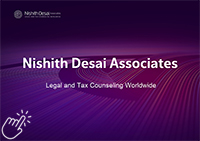|

June 04, 2024
Advancing ESG: India’s New Disclosure Frameworks by RBI and SEBI
RBI and SEBI have introduced
frameworks aimed at integrating climate-related
financial risks into India’s regulatory
regimes, aligning with global standards and
enhancing transparency and accountability within
the financial sector. RBI’s draft disclosure
framework mandates regulated entities to disclose
information on climate-related financial risks
and opportunities, covering thematic pillars
such as governance, strategy, risk management,
and metrics/targets, with a phased implementation
plan. SEBI’s BRSR guidelines
aim to simplify compliance while maintaining
rigorous sustainability reporting standards,
proposing modifications such as redefining the
value chain, introducing Green Credits reporting,
and replacing “assurance” with “assessment”
to reduce compliance burdens.
Introduction
Climate change presents profound risks to the
global financial system, influencing asset values,
financial markets, and institutional stability.
As the effects of climate change intensify, regulatory
bodies worldwide are shifting from voluntary
climate risk disclosures to mandatory reporting,
with a view to ensure financial stability and resilience.
In India, the Reserve Bank of India (“RBI”)
and the Securities and Exchange Board of India (“SEBI”),
have both introduced frameworks aimed at integrating
climate-related financial risks into their regulatory
regimes. This article examines these frameworks,
highlighting their significance, scope and implementation,
while addressing the challenges they present.
A. RBI’s Draft Disclosure
Framework on Climate-Related Financial Risks, 2024
Recognizing the critical impact of climate-related
risks on financial stability, RBI has introduced
a draft disclosure framework, 2024 for Regulated
Entities (“RE”).1
This framework aligns with global standards, such
as the EU’s Corporate Sustainability Reporting
Directive (“CSRD”)2
and the US SEC’s climate disclosure rules,3
ensuring that India’s financial sector remains
competitive and resilient. The disclosure framework
represents a significant stride towards the integration
of climate risks and opportunities within the Indian
banking ecosystem. It mandates REs to disclose information
on their climate-related financial risks and opportunities,
promoting early assessment and management. This
approach aims to ensure consistent and comparable
disclosures, mitigating the mispricing of assets
and the misallocation of capital and fostering market
discipline.
Applicability:
The RBI framework mandates the following REs
to disclose information on climate-related financial
risks and opportunities:4
All Scheduled Commercial
Banks (SCB), excluding Local Area Banks, Payments
Banks, and Regional Rural Banks. All Tier-IV Primary
(Urban) Co-operative Banks (UCBs). All All-India Financial
Institutions (AIFI), (viz. EXIM Bank, National
Bank for Agriculture and Rural Development (NABARD),
National Bank for Financing Infrastructure and
Development (NaBFID), National Housing Bank
(NHB), and Small Industries Development Bank
of India (SIDBI)). All Top and Upper Layer
Non-Banking Financial Companies (NBFCs).
Adoption of these guidelines remains voluntary
for entities other than those specified in the above-mentioned
categories. However, foreign banks must make disclosures
specific to their operations in India.
Thematic Pillars of Disclosure:
The REs must disclose under the following four
key thematic schemes, which include, Governance,
Strategy, Risk Management and Metrics and Targets.
The RBI seeks disclosures on a two-tier level: (a)
baseline; and (b) enhanced disclosures. These disclosures
highlight accountability and demand a potential
shift in the corporate governance process.5
|
Thematic Pillar
|
Description
|
Key Disclosure Requirements
|
|
Governance
|
Details the governance processes, controls
and procedures used to manage climate-related
financial risks and opportunities.
|
|
|
Strategy
|
Describes the RE’s strategy for
managing climate-related financial risks
and opportunities, including identification
of risks and opportunities over different
time horizons.
|
Identified
climate-related risks and opportunities
over short, medium, and long term. Impact of these
risks and opportunities on business,
strategy and financial planning. Resilience
of the strategy under different climate
scenarios.
|
|
Risk Management
|
Outlines the processes to identify, assess,
prioritize, and monitor climate-related
financial risks and opportunities and their
integration into the overall risk management
framework.
|
Policies and
processes for identifying, assessing,
prioritizing and monitoring climate-related
financial risks. Processes used
for managing climate-related risks. Integration
of climate-related risk management into
overall risk management processes.
|
|
Metrics and Targets
|
Details performance metrics related to
climate-related financial risks and opportunities,
including progress towards climate-related
targets.
|
Metrics used
to assess climate-related risks and
opportunities. Scope 1,6
Scope 27 and Scope 38
GHG emissions- Targets for managing
climate-related risks and progress against
these targets.
|
Implementation Plan:
Recognizing the need for a pragmatic and phased
approach, RBI has outlined a staggered implementation
plan for the framework:
| |
Governance, Strategy, and Risk
Management
|
Metrics and Targets
|
|
SCBs, AIFIs, Top and Upper layer NBFCs
|
FY 2025-26 onwards
|
FY 2027-28 onwards
|
|
Tier IV UCBs
|
FY 2026-27 onwards
|
FY 2028-29 onwards
|
|
*Disclosure requirements for other REs
are yet to be announced.
|
B. SEBI’s Business Responsibility
and Sustainability Report (BRSR) Guidelines
SEBI has also introduced frameworks to enhance
corporate transparency and accountability regarding
sustainability practices. Under the SEBI (Listing
Obligations and Disclosure Requirements) Regulations,
2015, SEBI implemented the BRSR guidelines in 2021.9
These guidelines aim to align Indian corporate reporting
with global best practices and respond to the growing
investor demand for sustainable investment options.
Recently, SEBI has issued a consultation paper
to seek public comments on recommendations by an
Expert Committee regarding the BRSR. The consultation
paper aims to simplify regulatory compliance and
reduce associated costs to companies, thereby facilitating
ease of doing business for listed entities.10
One of the central proposals of the committee
is to redefine the value chain in terms of its upstream
and downstream partners. The new definition proposes
that the value chain should include partners representing
2% or more of the listed entity’s purchases
or sales by value. An alternative proposal suggests
that the value chain should encompass partners representing
2% or more of purchases or sales by value, but cumulatively
covering at least 75% of the total purchases or
sales. This alternative is intended to reduce the
number of value chain partners from a potential
maximum of 50 to approximately 38, thereby simplifying
compliance while ensuring significant coverage of
key partners. Additionally, for the first year of
ESG disclosure reporting for the value chain in
FY 2024-25, reporting previous year numbers will
be voluntary. The proposal also suggests adopting
a “voluntary” disclosure approach
instead of the current “comply or explain”
approach for ESG disclosures and their assurance.
Another notable proposal involves the introduction
of Green Credits reporting. This follows a notification
from the Ministry of Environment, Forest, and Climate
Change regarding Green Credits.11 The
proposal suggests adding a leadership indicator
under BRSR to report the number of Green Credits
generated by both the company and its value chain
partners. This measure aligns with national environmental
policies and promotes transparency in sustainability
efforts.
The third significant proposal is to replace
the term “assurance” with “assessment”
in BRSR-related LODR regulations and SEBI circulars.
For FY 2023-24, companies would have the option
to undertake either an
“assessment” or “reasonable assurance” of BRSR Core disclosures.
From FY 2024-25 onwards, “assessment”
will replace “assurance”. An alternative
proposal offers flexibility, allowing companies
to choose between “assessment” or “assurance”
from FY 2023-24 itself. This change is aimed at
reducing the compliance burden, as “assessment”
is generally less costly and demanding than “assurance”,
thus facilitating easier adherence to reporting
requirements without compromising the quality of
ESG data.
SEBI’s consultation paper presents well-considered
modifications to the BRSR framework, designed to
ease compliance burdens while maintaining rigorous
sustainability reporting standards.
Analysis
Both RBI and SEBI frameworks mark progress towards
integrating ESG factors into India’s financial
system. These frameworks aim to enhance transparency,
accountability and resilience within the financial
sector by mandating disclosures on governance, strategy,
risk management, and metrics related to climate-related
financial risks and opportunities.
The RBI’s draft disclosure framework on
climate-related financial risks reflects a global
trend towards mandatory reporting to address the
growing risks posed by climate change. While the
framework sets out clear thematic pillars for disclosure,
its effectiveness may be hindered by challenges
such as data limitations, non-comparability of climate
risk assessment methodologies, and resource constraints.
Without adequate guidance and support, REs may struggle
to meet the stringent reporting requirements, leading
to incomplete or inconsistent disclosures.
Similarly, SEBI’s BRSR guidelines seek
to enhance corporate transparency and accountability
regarding sustainability practices. While the proposed
modifications, such as redefining the value chain
and introducing Green Credits reporting, demonstrate
SEBI’s commitment to aligning with global
best practices, challenges remain in ensuring widespread
compliance and standardization of reporting frameworks.
Challenges
Data limitations
and non-comparability: Both frameworks
face challenges related to the availability
and comparability of data. The lack of standardized
reporting frameworks and inconsistent data collection
methodologies hinder the assessment and comparison
of climate-related risks across different entities.
The non-comparability of climate risk assessment
methodologies presents a significant challenge
for both frameworks. Different entities may
use varying methodologies to assess climate-related
risks, making it challenging to compare risk
assessments and identify best practices. Standardizing
climate risk assessment methodologies will be
crucial for ensuring consistency and reliability
in risk reporting and decision-making. Resource constraints
and expertise gaps: Many REs lack the
necessary resources and expertise to conduct
comprehensive climate risk assessments and comply
with stringent reporting requirements. This
challenge is exacerbated by the broad scope
of the frameworks, which require REs to report
not only their emissions but also those of the
firms within their portfolios. Addressing these
gaps will require significant investments in
technology, training and capacity-building initiatives
to enhance REs’ ability to effectively
manage climate-related risks. Compliance
burden: Effective governance structures
and compliance mechanisms are essential for
ensuring the integrity and reliability of disclosures.
However, the phased implementation plans outlined
by both the RBI and SEBI may pose challenges
for smaller entities, which may struggle to
meet the requirements within the stipulated
timelines. Establishing robust governance structures
for handling ESG risks within REs will be crucial
for ensuring that ESG considerations are fully
integrated into operations and decision-making
processes. Overhaul of
portfolio evaluation methodologies:
The implementation of the frameworks will require
a significant overhaul of existing portfolio
evaluation methodologies. REs will need to incorporate
climate risk into credit risk assessment to
make more informed investment decisions. This
involves developing new methodologies for assessing
physical and transition risks and integrating
climate-related risks into business strategy
and decision-making processes. Scenario analysis:
The frameworks emphasize the need for REs to
conduct scenario analysis to evaluate the potential
impacts of different climate change scenarios
on their investments and operations. While scenario
analysis provides valuable insights, it demands
sophisticated modelling and data analysis capabilities,
which many REs currently lack. Developing these
capabilities will be necessary for REs to effectively
manage and disclose climate-related risks. Transition
plans: The frameworks require REs to
develop transition plans to move away from high-risk
areas and capitalize on emerging opportunities.
However, the success of these plans relies heavily
on the quality and reliability of the data gathered
through emission reporting and risk assessment.
Ensuring access to accurate and comprehensive
data is crucial for the effective implementation
of transition plans and the successful transition
to a low-carbon economy.
Conclusion
Despite these challenges, the RBI and SEBI frameworks
represent critical steps towards building a more
sustainable and resilient financial ecosystem in
India. It should enable a more robust sustainable
finance integrating environmental, social, and governance
(ESG) factors into investment decisions within the
financial sector. This approach aims to promote
long-term investments in sustainable economic activities
and projects. Environmental considerations encompass
efforts like climate change mitigation, biodiversity
preservation, pollution prevention, and embracing
the circular economy. Social aspects involve addressing
issues like inequality, inclusivity, labor relations,
investing in people and communities, and safeguarding
human rights. Governance matters encompass the structures
and practices of both public and private institutions,
ensuring that social and environmental concerns
are factored into decision-making processes.
Addressing the identified challenges will require
concerted efforts from regulators, REs, and other
stakeholders to provide guidance, support, and resources
needed for effective implementation. By encouraging
collaboration and innovation, India can strengthen
its position as a leader in sustainable finance
and contribute to global efforts to mitigate climate
change.
Within India’s framework, sustainable finance
is seen as financing that fosters economic growth
while lessening environmental strain, aligning with
the goals of the European Green Deal. This approach
integrates social and governance dimensions. Moreover,
framework laid down by SEBI and RBI focuses on encouraging
transparency regarding ESG-related risks that could
affect the financial system and advocates for managing
these risks through appropriate governance mechanisms
within financial and corporate spheres.
–
Sehar Sharma,
Maulin Salvi,
Rahul Rishi
and
Sahil Kanuga
You can
direct your queries or comments to the authors.
1https://www.rbi.org.in/Scripts/bs_viewcontent.aspx?Id=4393
2https://finance.ec.europa.eu/
regulation-and-supervision/
financial-services-legislation/
implementing-and-delegated-acts/
corporate-sustainability-reporting-directive_en
3https://www.sec.gov/files/rules/final/2024/33-11275.pdf
4The REs are required to disclose
the relevant information on a standalone basis,
rather than on a consolidated basis.
5https://www.techmahindra.com/
en-in/blog/towards-resilience
-navigating-rbis-climate-
related-disclosure-framework
-for-indian-financial-entities/
6Scope 1: greenhouse
gas emissions are direct greenhouse gas emissions
that occur from sources that are owned or controlled
by the RE.
7Scope 2: greenhouse
gas emissions are indirect greenhouse gas emissions
from the generation of purchased or acquired electricity,
steam, heating or cooling consumed by the RE. Purchased
and acquired electricity is electricity that is
purchased or otherwise brought into the RE’s
boundary. These emissions physically occur at the
facility where electricity is generated.
8Scope 3: greenhouse gas
emissions” are indirect greenhouse gas emissions
(not included in Scope 2 greenhouse gas emissions)
that occur in the value chain of an entity, including
both upstream and downstream emissions.
9https://www.sebi.gov.in/
legal/circulars/
may-2021/business-
responsibility-and-
sustainability-reporting
-by-listed-entities_50096.html
10https://www.sebi.gov.in/
reports-and-statistics/
reports/may-2024/consultation-
paper-on-the-recommendations-of
-the-expert-committee-for-facilitating
-ease-of-doing-business-with-
respect-to-business-responsibility-and-sustainability-report-brsr-_83551.html
11http://www.indiaenvironmentportal.org.in/
files/file/notifcation
%20on%20green%20credit.pdf
Disclaimer
The contents of this hotline should
not be construed as legal opinion. View detailed disclaimer.
This email does not constitute a legal opinion and may contain information generated using various artificial intelligence (AI) tools or assistants, including but not limited to our in-house tool,
NaiDA. We strive to ensure the highest quality and accuracy of our content and services. Nishith Desai Associates is committed to the responsible use of AI tools, maintaining client confidentiality, and adhering to strict data protection policies to safeguard your information.
This Hotline provides general information
existing at the time of preparation. The Hotline is
intended as a news update and Nishith Desai Associates
neither assumes nor accepts any responsibility for any
loss arising to any person acting or refraining from
acting as a result of any material contained in this
Hotline. It is recommended that professional advice
be taken based on the specific facts and circumstances.
This Hotline does not substitute the need to refer to
the original pronouncements.
This is not a Spam mail. You have received
this mail because you have either requested for it or
someone must have suggested your name. Since India has
no anti-spamming law, we refer to the US directive,
which states that a mail cannot be considered Spam if
it contains the sender's contact information, which
this mail does. In case this mail doesn't concern you,
please
unsubscribe from mailing list.
 |
|
We aspire
to build the next generation
of socially-conscious lawyers
who strive to make the world
a better place.
At NDA, there
is always room for the right
people! A platform for self-driven
intrapreneurs solving complex
problems through research, academics,
thought leadership and innovation,
we are a community of non-hierarchical,
non-siloed professionals doing
extraordinary work for the world’s
best clients.
We welcome
the industry’s best talent -
inspired, competent, proactive
and research minded- with credentials
in Corporate Law (in particular
M&A/PE Fund Formation),
International Tax , TMT and
cross-border dispute resolution.
Write to
happiness@nishithdesai.com
To learn more
about us
Click here.
|
|
Chambers
and Partners Asia
Pacific 2024:
Top Tier for Tax,
TMT, Employment,
Life Sciences, Dispute
Resolution, FinTech
Legal
Legal 500
Asia Pacific 2024:
Top Tier for Tax,
TMT, Labour &
Employment, Life
Sciences & Healthcare,
Dispute Resolution
Benchmark
Litigation Asia
Pacific 2023:
Top Tier for Tax,
Labour & Employment,
International Arbitration
AsiaLaw
Asia-Pacific 2023:
Top Tier for Tax,
TMT, Investment
Funds, Private Equity,
Labour and Employment,
Dispute Resolution,
Regulatory, Pharma
IFLR1000
2024: Top
Tier for M&A
and Private Equity
FT Innovative
Lawyers Asia Pacific
2019 Awards:
NDA ranked 2nd in
the Most Innovative
Law Firm category
(Asia-Pacific Headquartered)
RSG-Financial
Times:
India’s Most
Innovative Law Firm
2019, 2017, 2016,
2015, 2014
|
|
|
|





